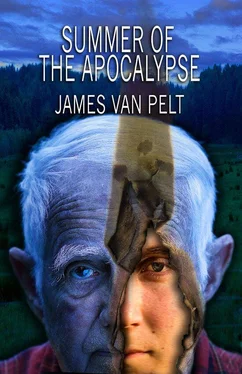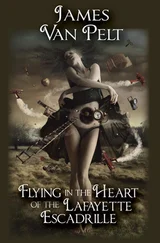“I thought you’d got it all.”
Dad grimaced and pushed himself upright. “Is your radio working?” Eric shook his head.
“I’m going to find out about this.” He waved his hand at the road. “Then I’ll drive into Idaho Springs. I want you to go with me.”
Normally, before this horrible, weird week, Eric hated driving with his father, partly because Dad braked a half block earlier than he needed to, as far as Eric was concerned, and he always took the shortest route, even if a slightly longer one had ten fewer stop lights. He also hated driving with his father because of the silence. Long, dry, uncomfortable minutes would pass, and neither of them said anything, then Dad would say something stupid like, “How’s school?”
In Idaho Springs, though, Eric could buy batteries. “Sounds great. Let’s go!” He slid his arms into his pack straps and followed Dad down the path.
A half mile east of the cave, US Highway 6 went through a short tunnel. Dad had hidden the van down a weed-choked access road that cut away from the highway right before this tunnel. He’d parked it behind a thick stand of Cottonwoods. Eric walked ahead, though Dad kept urging him to stay back. The air smelled wet and cold next to the river. By the cave, a hundred feet above the canyon floor, it smelled dusty, like pinyon.
Eric was thinking of Amanda again. She had baby-fine blonde hair that brushed her shoulders. When she played the flute, her head tilted to the side and he could see the pulse in her neck, the way her lips pursed over each note. He had wanted more than anything to hold her hand in the hallway, so he made a plan, a stupid plan, now that he remembered it, but the only one that he thought might work. The door out of the band room was wide enough for two people to walk together. If he left the room the same time she did, if he let his hand swing as he walked, he could time the swinging of his hand with her hand, then naturally, oh so naturally, let them meet. Then, they would be holding hands.
“Eric, stay back,” repeated Dad. The darkness of the tunnel loomed before them. It amplified the river, making the splash of water on rocks sound like clapping. They turned onto the access road. A patch of brambles caught Eric’s sock. He bent and carefully brushed them away. Dad walked past him. When Eric caught up, Dad stood to the side of the road, his arms crossed on his chest. The van, Eric saw, rested on four flats. The windows were broken in and the hood was up. Eric didn’t need to look at the engine to know that it too was vandalized. “Sheesh. Now we’re in for it.” Eric peered into the van, careful to keep his hands off the jagged edges around the windows. The seat covers were slashed and white stuffing pushed out of the slits. Dad climbed the slope above the car and rolled some rocks off a pile.
“Hah! They missed our stuff though.” A corner of a box showed between two of the stones. “We’ll get this later.” He looked at the van for a moment. Eric tossed a handful of pebbles into the creek where the foam swallowed them without a splash. He thought they might hitchhike to town, then he remembered there was no traffic. “Sheesh!” he said again.
Dad covered the box, then slid down the slope. “We walk,” he said and moved resolutely up the path to the highway.
When they passed the hidden trail to the cave, Eric was thinking again of Amanda. She smiled often. Sometimes, when they played a section of music particularly well, she smiled at him, but they didn’t ever talk. He didn’t know what to say once he got past “Hello,” and “How are you?” He thought, why did I think she’d hold hands with me? He blushed remembering how his plan hadn’t worked out, and he was glad his father was ahead of him.
School this year was so weird anyway, he thought. Everybody talking about the disease. The newspapers called it “Mega-cold” or “The Austrian Cold,” or “Beggar’s Fever,” because doctors first identified it among the homeless in Vienna. We were still cheering at football games when the T.V. started reporting the disease. It was a curiosity, something happening to people far away. First they’d act as if they had a cold, sniffing and coughing, then, after a week or so, the fever would start, and within twenty-four hours they’d be dead. The fever wouldn’t break, even after they died, the newspapers said. For hours afterward the virus ate at the body, creating its own heat. The disease’s progress was simple: two weeks contagious, one week of the cold, one day of fever, then death. He’d heard that airborne droplets from coughs transmitted the virus a mile downwind. So did sweat. Brian Knudson told him, in a horrified whisper, just touching a doorknob an infected person had handled a week before gave one the disease.
Adults acted funny too. The band director, even, told everyone in the woodwind section not to swap reeds. All the fuss, though, didn’t touch Eric. Teachers talked about the disease. Students staged benefit concerts, and the school nurse gave talks in class about health issues. But Eric could only think about Amanda’s hand, Amanda’s beautiful, remote and lonely hand.
He shook his head ruefully. Four days in a row he’d tried for it as they left the band room. The first time, Theresa Ortiz got in the way. The next three times his nerve failed him, but the fifth time, Friday, the last week in May, he lined himself perfectly. They reached the door, shoulder to shoulder. He smelled her perfume, he was so close, and underneath that, he imagined, something else, lilacs, like her bath soap perhaps. The thought made his head swim: her bath soap! He could in a moment be walking in the hall, hand in hand with Amanda Grieves, the prettiest girl in the flute section. Heck, the entire band. She wasn’t like those women in the Metallica posters, the Prince posters, with black mesh stocking and metal studded leather bikinis. She was real. His forearm brushed hers. He wiped his hand on his leg, then timed his reach. There! He caught her hand in his. For a second, all was perfect. He had her hand. Then she stopped, jerked it away and said, “What do you think you’re doing?” She looked at him, puzzled. “Were you trying to hold my hand?” she asked. He couldn’t speak. Someone bumped her from behind, and she joined the crowd in the hall. Other band members pushed past him where he stood, blocking the doorway.
Later, Eric sat in the lunch room poking at his Salisbury Steak. At the table next to his, a couple sat facing each other, foreheads almost touching, holding hands. He wondered, how do they do it? How do people ever get to hold hands?
A few weeks after that, he got a girlfriend, but he couldn’t shake the sight of Amanda’s sculpted and impossible fingers, lightly curled, brushing her thigh as she walked.
The high tech, straight-as-a-mountain-road-could-be multi-lane I-70 replaced the old, curvy, two-lane US Highway 6 in the mid-1960s. Until 1991 when Colorado made small stakes gambling legal in Black Hawk and Central City, only slow-paced tourists and fishermen used the old road that followed the course of Cripple Creek, crossing occasionally. When the road builders could figure no other way, the road dove through short tunnels where children in station wagons urged parents to beep their horns. The scenic route ended where the old highway merged with the new via a long, steep entrance ramp. Just before noon, Eric trudged up this ramp behind his dad, who had not rested since they began hiking three hours before. The creek gurgled over rocks to Eric’s left. Other than their feet scuffing the asphalt, the lively chatter of the water was the only sound he had heard since they left the van. Neither Eric nor his Dad had spoken. The wet sounds reminded Eric that his throat ached from thirst. His shoulders throbbed where the pack weighed them down. His feet hurt; he could feel blisters forming where his perspiration-soaked socks rubbed on each step. He glanced at his dad. A broad swath of sweat stained the back of his shirt to his belt.
Читать дальше












